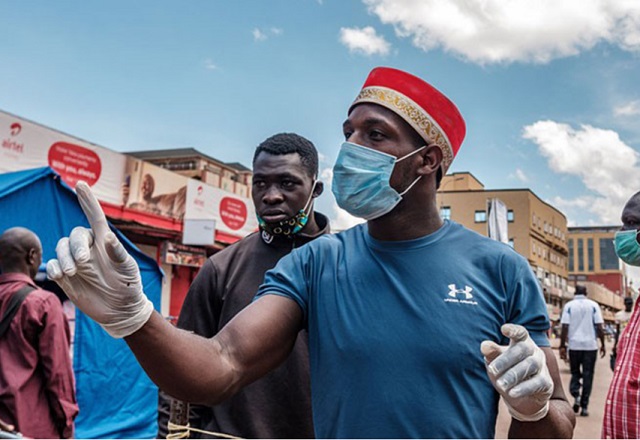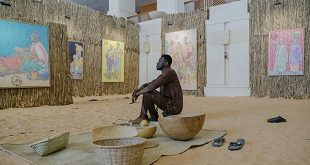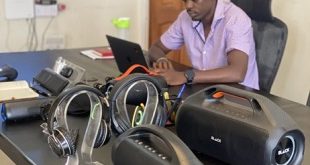
Local scientists join other Africans using international connections to boost their countries’ virus-fighting capabilities.
| LINDA NORDLING | In February, Prof. Moses Joloba, a Ugandan microbiologist who usually works on tuberculosis diagnostics, received an unusual offer from a collaborator in the United States.
The collaborator’s institution, Case Western Reserve University (CWRU) in Cleveland, Ohio, had designed primers — short sequences of nucleotides, the building blocks of DNA — that could detect the coronavirus SARS-CoV-2 using polymerase chain reaction (PCR). Did Joloba’s lab at Makerere University in Kampala want to partner up to boost Uganda’s testing capacity?
At the time the offer was made, sub-Saharan Africa had few coronavirus cases, and Uganda — a country of 43 million people — had already set up a coronavirus testing laboratory, at the Uganda Virus Research Institute in Entebbe. So Joloba, who heads the department of Medical Microbiology, Makerere University College of Health Sciences, turned down the offer.
But after the country identified its first case, on 21 March, the government announced an ambitious programme of quarantine, testing and contact tracing, and demand for test kits and laboratory capacity skyrocketed.
With the whole world clamouring for supplies, Joloba wrote back to his U.S. colleague, who responded by sending enough chemicals for 20,000 test kits. “Although the supplies took about ten days to arrive, it was one of the fastest ways to get equipment,” Joloba recalls.
International cooperation
As in much of the rest of the world, many researchers in Africa are pivoting to coronavirus work. But they are also having to leverage their global scientific connections to source know-how and supplies. That’s because wealthier countries also need this equipment to deal with their own outbreaks. Last month, John Nkengasong, director of the African Centres for Disease Control and Prevention in Addis Ababa, wrote in the international science journal `Nature’ about how African countries are being priced out of the market for coronavirus diagnostics.
Exports of some types of personal protective equipment from the United States need authorisation from the Federal Emergency Management Agency. But there are no restrictions on exporting coronavirus test kits. In spite of this, Joloba’s U.S. collaborator Henry Boom, CWRU’s head of infectious-disease research, faced criticism from some at home who felt the gift was eating into Ohio’s own testing capacity. Boom says the university did not send test kits — only primers and probes that were not scarce.
“We did not deprive anyone of testing in the U.S,” he told Nature. The gift turned out to be a significant boost for Uganda. As of 10 May, Joloba’s lab had carried out more than 14,000 tests — just under one-quarter of the country’s then total of 63,559.
The United States is not alone in controlling access to some medical supplies. The European Commission has also asked member states to limit exports of some protective equipment. France has issued a list of medicines — including remdesivir and hydroxychloroquine, which are being tested as possible coronavirus treatments — that cannot be exported.
But global links between researchers are helping some supplies to get through. Joloba who completed his MBChB at Makerere University Medical School Kampala in 1994 and PhD in Molecular Microbiology at Case Western Reserve University, Cleveland, Ohio, USA, established the Molecular Biology laboratory in the Department of Medical Microbiology in 2003. He is also the head of Supranational Reference Laboratory Uganda.
Before COVID-19, Gordon Awandare led research teams studying malaria, tuberculosis, HIV/AIDS and other diseases at the University of Ghana in Accra. His lab is now sequencing SARS-CoV-2 genomes from people in Ghana. And some of his staff have moved to the nearby Noguchi Memorial Institute for Medical Research, which is doing the bulk of the country’s coronavirus testing.
Awandare and his team are able to conduct sequencing because colleagues at institutions in the United Kingdom have sent him hard-to-come-by chemicals, such as reagents and primers. These supplies would take three to six months to arrive through normal procurement channels, he says. “With the help of (international) collaborators, it takes two to four weeks,” Awandare adds.
He is also about to receive 2,000 coronavirus-antibody test kits from the University of Edinburgh, UK. These will be used to measure immunity levels in Accra, and are part of a multi-country project to validate the test while measuring infection rates in African populations.
 The Independent Uganda: You get the Truth we Pay the Price
The Independent Uganda: You get the Truth we Pay the Price

